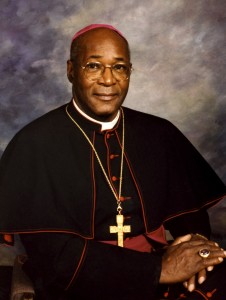
Bishop Moses B. Anderson, a retired auxiliary bishop of Detroit, died Jan. 1. He was 84. (CNS photo/courtesy of Archdiocese of Detroit)
LIVONIA, Mich. (CNS) — A funeral Mass was scheduled for Jan. 7 at the Cathedral of the Most Blessed Sacrament in Detroit for retired Auxiliary Bishop Moses B. Anderson, who died Jan. 1 in the Detroit suburb of Livonia, where he had been living in his retirement. He was 84.
A Jan. 2 statement from the Archdiocese of Detroit said Bishop Anderson died of cardiac arrest.
Born in Selma, Ala., in 1928, he was ordained an Edmundite priest in 1958. During his 25-year anniversary as a priest, he was ordained an auxiliary bishop of Detroit, a post he held for 20 years before retiring from active ministry in 2003.
At the time of his ordination, he was one of seven African-American bishops in the United States. At the time of his retirement, he was the senior active black bishop in the country.
[hotblock]
The week after his retirement, Bishop Anderson flew to Ghana, where he traces his ancestry, to deliver a previously scheduled series of lectures on inculturation.
In 1990, during a trip to Ghana, he was given a new title and “enstooled,” so called because of the stool on which such dignitaries sit, as Kwasi, Aduanahene of Antoa — which means Sunday, tribal chief of the Aduana, his ancestral clan, of the village of Antoa. The honor was given in appreciation of his work in Detroit to send development supplies to the village.
At the time, Bishop Anderson told Catholic News Service that the honor, bestowed with elaborate ceremonies, was “a cultural thing that has no political power attached.” But he said it meant a lot to him because “ever since 1949 I have called myself Ghanaian-American.”
It was that same year that Bishop Anderson became a Catholic. Two years later, he began studying for the priesthood.
In 1984, Bishop Anderson participated in writing “What We Have Seen and Heard,” the first joint pastoral letter by the country’s black bishops, on the topic of evangelization. It called on African-American Catholics “to reclaim our roots and to shoulder the responsibilities of being both black and Catholic.”
In one of his first major speeches as a bishop, as keynoter for the 1983 Shepherds Speak series at St. James Cathedral in Brooklyn, N.Y., he warned that the United States was “going backwards” on race relations after years of improvement. He lauded the efforts of the church, especially his fellow bishops, to speak out against racism and resist it.
From 1992 to 2001, Bishop Anderson doubled as pastor of Precious Blood Parish, a predominantly black parish in Detroit. In 1992, he said the acquittals of police in the Rodney King beating trial did not “bode well for the country.” He added he had tried to evangelize his parishioners along peace and justice themes, but “we’re running into all kinds of difficulties because of incidents like this.”
At a 1995 conference near Washington on pastoring black parishes, Bishop Anderson remarked, “Some say the parish will not survive because of the lack of priests, the lack of religious, the lack of deacons, or the lack of lay ministers. Some say the lack of good relations between the clergy, religious and lay ministers threaten the survival of the parish. … They may threaten the survival of a particular parish but not the church. We must evangelize in such a manner that we live and preach the staying power of both the universal church and the local ecclesial community.”
Following a 2004 “ad limina” visit with Blessed John Paul II, Bishop Anderson remarked that whenever he is in Rome, he makes a point to attend the audience “just to be with the Holy Father as much as possible.” He added, “It’s awesome to stand right beside him and bless all those people.”
PREVIOUS: Budget deal defined as much by what’s left undone as by what it does
NEXT: Atlanta pastor named auxiliary bishop



Share this story